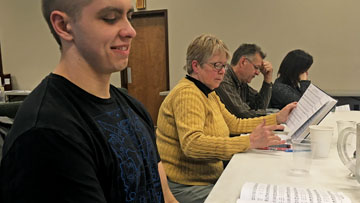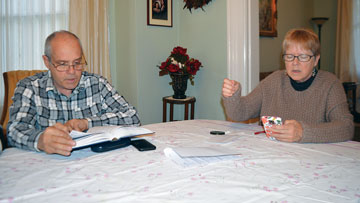You have free articles remaining this month.
Subscribe to the RP Witness for full access to new articles and the complete archives.
On Thursday nights, a small group from the Oswego Reformed Presbyterian Church gathers in elder Kevin Plummer’s home with their psalters and tea.
They call themselves the invisible choir.
The invisible choir formed in this upstate New York church after The Book of Psalms for Worship was introduced to the church. Many of the tunes presented a challenge to the congregation.
“When the blue psalter first came out, we crashed and burned a lot,” said Kit Swartz, the church’s pastor of 35 years. Swartz said the congregation experimented with taking time during evening worship or Sabbath school to work on the new tunes, but they found this inefficient. They also considered having a traditional choir in the front or back of the church.
The invisible choir was born with the intention of familiarizing people in the congregation with the tunes to prepare them for worship on Sunday. Each member of the choir sits where he or she would normally sit, integrated into the congregation.
“Praise is a corporate thing,” Swartz said. “We’re averse to any hint of performance, and sitting wherever we sit actually is more serviceable to the goal of encouraging everybody to sing.”
The invisible choir practice sessions typically see a half dozen attendees. The group practices each psalm that will be sung in the church service, rehearsing them with the melody and the parts, and then moves on to other tunes by request.
Everyone is welcome to attend, not just naturally skilled singers, said Deb Standish, the church’s precentor. Choir members include those who cannot read music and simply like to sing the melody or learn to harmonize by ear. The group uses the psalter app when necessary to better understand the tune.
“The more you practice when you’re not a good singer, the better you get,” Standish said. “We have a gentleman in the congregation who is tone deaf, but after years of singing he sings pretty well. He doesn’t throw me off anymore.”
Plummer admitted that he can’t read music, but he wants to sing the bass parts during worship to balance the singing. “I get a chance to work on the bass part and get comfortable with it,” Plummer said. “Unfortunately, I’m a slower learner, but it does help me a lot to learn those parts.”
One of the biggest benefits of the invisible choir has been the enhancement of singing throughout the whole congregation. John McGrath, an elder at Oswego RPC, said the beauty of singing has been heightened in worship and helps everyone improve.
“If you are by people who are just learning how to sing or aren’t familiar with the tune, they have someone next to them who knows what’s going on,” McGrath said. “Having the parts present in the auditorium for each piece makes singing a cappella a whole lot more beautiful.”
Standish said her job as a precentor has become easier since the invisible choir began. The church is better at working together as singers, and she has more confidence in the melody. She appreciates having a handful of singers in the congregation who can help carry the tune and incorporate parts.
Finding the time to set aside for another night of a church activity can be difficult, the choir members admitted. Plummer said he started hosting the invisible choir to push him to attend every practice. The benefits outweigh the occasional inconvenience of a busy Thursday evening.
“I really enjoy singing the parts with people who know how to read music and know how it’s supposed to sound,” Plummer said. “It gives me confidence and I don’t come by that easy, not with singing.”
McGrath said the invisible choir provides another form of fellowship with other members of the congregation. Most of the choir participants are longtime members, and they talk about the Psalms’ content as well as the tunes. Though the focus is on the music, conversation strays to the words, with choir members bringing up what they have been studying in the Psalms.
The invisible choir’s practice is more flexible than other church events, however. It stays informal and is rescheduled around other events going on or is canceled for bad weather. Swartz said he highly recommends that congregations try something similar to aid in singing during worship.
“We do all have the common privilege and duty of singing a skillful song, so by one means or another we need to do this,” Swartz said. “We need to encourage and facilitate congregational singing, and this has been very good for us. It seems to be the kind of thing that any congregation could do.”
Lydia Goerner graduated in May with a degree in journalism from the State University of New York at Oswego. She now lives in Wareham, Mass., where she works as a reporter and attends Christ RPC in Providence, R.I. In her free time, Lydia enjoys traveling, visiting aquariums, and learning how to cook.

